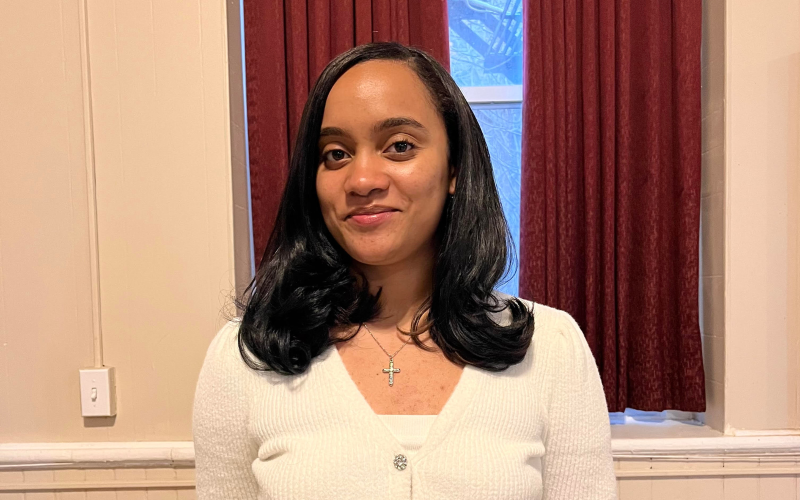MPH Student Combines Doula Services with Public Health Expertise to Combat Maternal Health Disparities

ALBANY, N.Y. (April 18, 2024) — From a very early age, second-year Master of Public Health (MPH) student Samantha Cruz was aware that her community faced health disparities. A first-generation college student from Brownsville in Brooklyn, NY, Cruz was awarded a full scholarship through the Strengthening the Public Health Workforce Training Program at the UAlbany School of Public Health. In addition to pursuing her MPH, Cruz will also graduate with a Graduate Certificate in Maternal and Child Health.
Cruz sees public health as part of a larger mission to achieve social justice.
“The lack of resources in Black communities is linked to historical and systemic inequalities, which perpetuate disparities in access to healthcare, education, economic opportunities, and social services,” Cruz explains. “This lack of resources leads to higher rates of chronic diseases, limited healthcare utilization, and disparate health outcomes among Black individuals and families. I decided to get my MPH to not only address the systemic issues plaguing low-income communities of color but also to empower individuals with the necessary tools and information to lead healthier lives.”
As part of her internship with Black Health in Harlem, NY, Cruz has already received hands-on training for addressing community health through her work on the Central New York Community Health Assessment. She recently traveled with her mentor to Buffalo, NY, where she helped coordinate a focus group interview.
“We talked about mental health, Black maternal health, and HIV/AIDS/STIs and how providers and policymakers can address the systemic racism black communities face within the healthcare system. This experience was important because it will allow me to write a strong report for Black Health to showcase at their town hall meeting, which in turn will help them fulfill the needs of the community,” Cruz explains.
Although Cruz hopes to work to improve community health overall, she has a special focus on reducing Black maternal mortality, which in the U.S. is 2.6 times the rate of non-Hispanic white women. In addition to working towards her MPH and a certificate in Maternal and Child Health, Cruz is also in the process of earning a postpartum doula certificate. A postpartum doula is a professional who works to ensure that the physical and emotional needs of a pregnant person are met after they give birth. This period is sometimes referred to as the “fourth trimester,” and it is a time where all birthing people, but especially Black women, are particularly vulnerable. A doula can help by acquiring informational and hands-on support to new parents and their families during this crucial period.
“I will receive my certification through an organization called DONA International, which offers evidence-based doula training, certification and continuing education,” says Cruz. “I plan to combine my public health expertise and doula experience by prioritizing health equity and cultural competency. Black mothers are three times more likely to undergo medical complications during birth, and they often do not seek medical attention until after their sixth week post-partum, and so much can happen in that window. This can lead to chronic health issues, poor mental health, and overall difficulty in transitioning to parenthood. As a doula I want to be a resource and advocate for Black mothers.”
There is mounting evidence that doula services can be a powerful tool in combatting maternal health disparities. One study from 2014 found that decreased access to doula services leads to poorer birth outcomes. Among birthing people who expressed an interest in using a doula, those who were not able to access one faced a 73 percent higher risk of undergoing a non-indicated cesarean delivery compared with those who received doula support. The same authors point out that Black pregnant people and those with low socioeconomic status are more vulnerable to poor health outcomes due to allostatic load due to disease, poverty, racism and violence. The support offered by a doula can help to alleviate some of these risks. Cruz hopes to one day leverage her education and doula training into a leadership position where she will be able to enact lasting positive change.
“My goal when I graduate this May is to work in outreach or research by becoming a program coordinator or policy analyst to learn more about the population I will be serving, in addition to working part-time as a doula. As I continue my journey, my long-term goal is to become a program director at a health care organization targeting underserved populations. By actively engaging with community members, working alongside policymakers to propose solutions, collaborating with local organizations, and implementing evidence-based interventions, I aim to not only make a positive impact on the health of the individuals I serve but also to build trust and foster sustainable change within these communities.”


